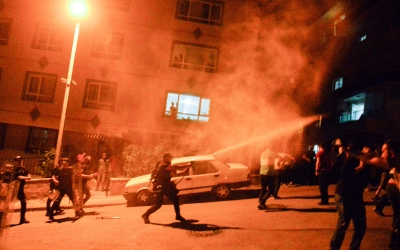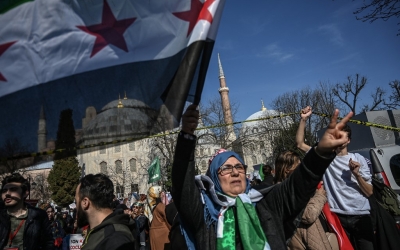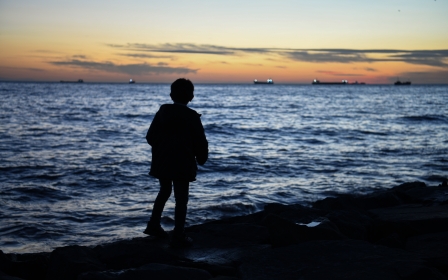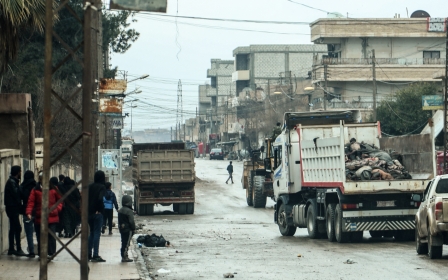Turkey accused of sending scores of refugees back to Syria
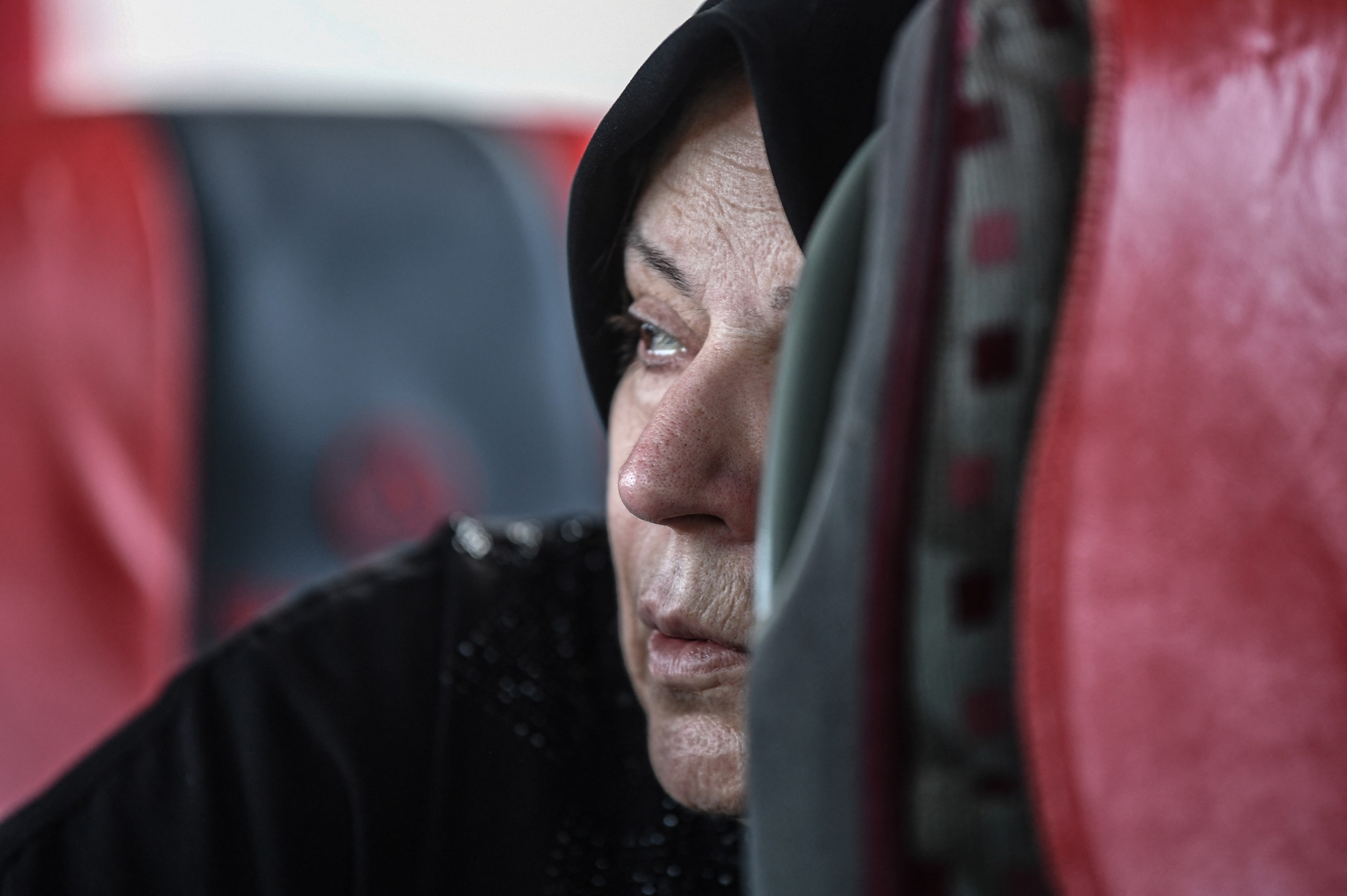
Turkish authorities deported up to 150 Syrian refugees from Istanbul to rebel-held northern Syria on Saturday, Syrian media reported, following escalating anti-refugee rhetoric in Turkey.
In widely-shared videos, young Syrians in deportation centres in Turkey explained that they have legal residence papers, families in Turkey, or are enrolled in local universities.
Others say they had work permits but were forced to sign papers agreeing to be returned to Syria after 10 days in prison.
Young men from specific neighbourhoods of Istanbul were arrested by city-wide search patrols, including in the Esenyurt district, a refugee enclave, and the Kucukcekmece district.
“A policeman stopped me in the street after I finished my work, I gave him my residency papers, but he took me to a police station,” Ahmed Dinar, a deported Syrian who says he was forced to sign return papers, told Middle East Eye.
New MEE newsletter: Jerusalem Dispatch
Sign up to get the latest insights and analysis on Israel-Palestine, alongside Turkey Unpacked and other MEE newsletters
"I'm now on the street in Azaz, north of Aleppo, I don't know anyone in this area."
Nadia Hardman, Refugee and Migrant Rights Researcher at Human Rights Watch, told MEE on Tuesday: “Human Rights Watch is deeply alarmed at the news that Turkish authorities have seemingly deported 150 Syrian nationals to Syria at a time when we know Syria is not safe for returnees.
“Sending people back to Syria when they fear persecution could amount to a breach of Turkey's non-refoulement obligations.”
Refugees returning to Syria face serious risks, including torture, extrajudicial killings and kidnapping at the hands of Syrian government forces and their militias, the rights group said in October.
A senior Turkish official speaking to MEE on Tuesday denied the reports. "I can confirm that we didn't deport any Syrians last weekend," they said, "especially ones with residence permits and work permits. We also didn't encounter anything that can verify these reports.
"We routinely make ID checks and controls to detect illegal immigrants and criminals as we did last weekend nationwide to increase the security and safety of our citizens," the official added.
Legalities
Turkey has its own local legislation, known as the Temporary Protection Act, for managing the affairs of Syrian refugees in the country.
The law obliges Syrian refugees not to leave the province that granted them residency papers, except with a travel permit bearing a start and end date. Syrians need to submit a formal application for this, which is sometimes refused.
They also have to update their personal information whenever they change homes within the same city and obtain official work papers. These are of no use, however, if their residency papers belong to another state.
Any breach of the law can result in deportation, in which case it becomes almost impossible to obtain residency papers again.
Syrians in Turkey cannot get passports, which are usually granted to refugees, meaning they cannot leave the country.
Most resort to working in Istanbul, as in other provinces they tend to struggle to find work.
But there they face another obstacle: for nearly two years Istanbul has not granted residence permits to refugees.
Istanbul also began imposing new restrictions last year. The city no longer updates the personal details of Syrians who move to the neighbourhoods of Esenyurt and Al-Fatih - invalidating their residency papers - to reduce what it sees as overcrowding of Syrians.
Mass deportation
Though his government in the past has been accused of forced deportations of Syrians, last July, Turkish President Recep Tayyip Erdogan vowed never to return Syrian refugees whilst in charge.
His comments came in response to opposition leaders' ongoing calls for mass deportation.
“I will return the Syrians to their country when I take power,” Kemal Kilicdaroglu, the leader of the opposition Republican People's Party, has said on more than one occasion.
Another official in the party said that the opportunity has come for the Syrians to return, based on a bogus presidential pardon issued by Syrian President Bashar al-Assad every year.
Umit Ozag, the leader of the Turkish Victory Party, said in a video clip posted on Twitter, addressing the Syrians: "Your visits have ended, the Turkish community no longer welcomes you, go back to your country."
Lawyer Ghazwan Koronful, director of the Syrian Lawyers Association in Turkey, told MEE: "It is possible that the situation of Syrians in Turkey will deteriorate significantly until the next Turkish presidential elections, in 2023."
He estimated that the escalating audit and inspection campaign in Istanbul could force more than a million Syrians to return.
“In some cases there are legal reasons for the deportation of refugees... but in other cases there is no reason," Koronful said. "In any case, there is no humanitarian reason to return a refugee fleeing from war."
'They can easily deport Syrians'
A senior aid worker that deals with Syrians in Istanbul told MEE: "There is a general feeling among law enforcement that they can easily deport Syrians, considering the tensions in the country."
Apart from the Syrian refugees, Turkey is also home to many irregular migrants from Central Asia and Africa.
The Syrian war, which broke out in 2011 after government forces confronted protesters with military force, has caused nearly 7 million Syrians to flee the country, in the world's largest refugee crisis since the Second World War.
The refugees are concentrated in the countries surrounding Syria. Roughly four million reside in Turkey, one million in Lebanon and about 700,000 in Jordan. Six million or so have been displaced from their homes within the country's borders.
Last year, the ongoing conflict killed about 1,300 civilians, while government forces arrested about 1,000 people and displaced about 86,000 civilians inside the country, according to the Syrian Network for Human Rights, a UK-based activist group with a network of sources on the ground.
MEE's Ragip Soylu contributed to this story
Middle East Eye delivers independent and unrivalled coverage and analysis of the Middle East, North Africa and beyond. To learn more about republishing this content and the associated fees, please fill out this form. More about MEE can be found here.



